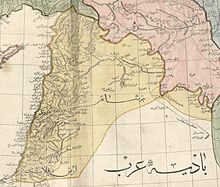
Southern Syria (Arabic: سوريا الجنوبية Sūriyā l-Janūbiyya) is a geographical term referring to the southern portion of either Ottoman-Period Vilayet of Syria,[1] or modern-day Arab Republic of Syria .
The term was used in the Arabic language primarily from 1919 until the end of the Franco-Syrian war in July 1920, during which the Arab Kingdom of Syria existed.[2][3][4][5]
Zachary Foster in his Princeton University doctoral dissertation has written that in the decades prior to World War I, the term “Southern Syria” was the least frequently used out of ten different ways to describe the region of Palestine in Arabic, noting it was so rare that “it took me nearly a decade to find a handful of references”.[6]
- ^ Kazziha, Walid. The Social History of the Southern Syria (Trans-Jordan) in the 19th and Early 20th Century. Beirut Arab University. 1972.
- ^ Gerber, Remembering and Imagining Palestine: Identity and Nationalism from the Crusades to the Present, MacMillan, 2008, pp.165–166: “It is interesting that even as late as 1918 Palestine was regarded as an independent entity. Syria was not seen as a mother-country. The idea of amalgamation was to emerge about a month later, following a strenuous campaign by its supporters. But the documents relating to the initiation of the proposed fusion show what was newly constructed and what was the original (and traditional) mode of self-perception. Thus, the document that speaks about the election of candidates to the first Palestinian congress starts by saying inter alia: muqat`at suriyya al-janubiyya al-ma`rufa bi-filastin, that is, the land of Southern Syria, known as Palestine. In other words, what everybody always knew as Palestine is henceforth to be named Southern Syria. Put differently, the writers were fully aware that had they called the country simply Southern Syria, nobody in the Middle East would have known what they were talking about. But no one needed a map or a dictionary to know what the term Palestine meant. This document also offers a simple explanation for the then popularity of the Syrian option: It was simply the case that for a brief moment Syria was an independent, not to say Arab, country. In Palestine everything was different, and the future looked very bleak indeed. The way in which the term Southern Syria was explained by the term Palestine is not confined to a single document. In fact, a more or less similar variant appears in all the documents from this period that mention the term “Southern Syria”: Southern Syria is given as the name of the country, despite the fact that the known term is Palestine. Obviously, Southern Syria was not a traditional name, or even a formal geographical definition. On the contrary, the way in which the term Palestine is always used to explain Southern Syria supports the conclusion that it was quite well known to everybody in the area in 1914 and could not have been invented because of Zionism or for any other reason.”
- ^ Rashid Khalidi, Palestinian Identity: The Construction of Modern National Consciousness, Columbia University Press, 2010, pages 165–167
- ^ Benny Morris, Righteous Victims, pages 35–36.
- ^ Communication from the Arab Revolt in Southern Syria-Palestine (in Arabic) Archived 14 July 2011 at the Wayback Machine
- ^ Foster, Zachary (November 2017). "Southern Syria". The Invention of Palestine (thesis). Princeton University. pp. 20–21. ISBN 9780355480238. Docket 10634618. Archived from the original on 29 July 2021. Retrieved 9 February 2018.
The Arabs described "the area that became Israel," as Meir put it, in at least ten different ways in the decades prior to World War I, roughly in this order of frequency: Palestine; Syria; Sham; the Holy Land; the Land of Jerusalem; the District of Jerusalem + the District of Balqa + the District of Acre; southern Sham; the southern part of Sham; the Land of Jerusalem + the land of Gaza + the land of Ramla + the land of Nablus + the land of Haifa + the land of Hebron (i.e. cities were used, not regions); "the southern part of Syria, Palestine"; and southern Syria. The Arabic term "southern Syria" so rarely appeared in Arabic sources before 1918 that I've included every reference to the phrase I've ever come across in the footnote at the end of this paragraph (it did appear more often in Western languages). Golda Meir, Mikhaʼel Asaf and my Shabbat hosts were right about Southern Syria, but by focusing only on the facts that supported their arguments and ignoring all the others, they got the story completely wrong. They used facts to obscure the history. If the term rarely appeared in Arabic before World War I, how do propagandists even know it existed? Before World War I, they don't. It took me nearly a decade to find a handful of references, and I can assure you few if any propagandists are familiar with its Arabic usage before 1918. But that changed dramatically in 1918, when the term gained traction for a couple of years until 1920. That's because the Hijazi nobleman Faysal revolted against the Ottoman Empire in 1916 during the First World War (alongside "Lawrence of Arabia"), and established an Arab Kingdom in Damascus in 1918 which he ruled until the French violently overthrew him in 1920. During his period of rule, many Arabs in Palestine thought naively that if they could convince Palestine's British conquerors the land had always been part of Syria—indeed, that it was even called "southern Syria"—then Britain might withdraw its troops from the region and hand Palestine over to Faysal. This led some folks to start calling the place southern Syria. The decision was born out of the preference of some of Palestine's Arabs to live under Arab rule from Damascus rather than under British rule from Jerusalem—the same British who, only a few months earlier, in 1917, had declared in the Balfour Declaration their intention to make a national home for the Jews in Palestine.